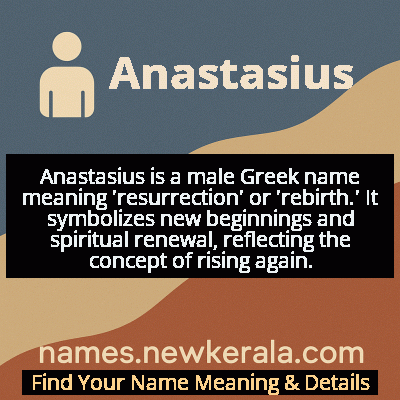Anastasius Name Meaning & Details
Origin, Popularity, Numerology Analysis & Name Meaning of Anastasius
Discover the origin, meaning, and cultural significance of the name ANASTASIUS. Delve into its historical roots and explore the lasting impact it has had on communities and traditions.
Name
Anastasius
Gender
Male
Origin
Greek
Lucky Number
7
Meaning of the Name - Anastasius
Anastasius is a male Greek name meaning 'resurrection' or 'rebirth.' It symbolizes new beginnings and spiritual renewal, reflecting the concept of rising again.
Anastasius - Complete Numerology Analysis
Your Numerology Number
Based on Pythagorean Numerology System
Ruling Planet
Neptune (Ketu)
Positive Nature
Intuitive, analytical, spiritual, and inquisitive.
Negative Traits
Secretive, reserved, aloof, and can be overly critical.
Lucky Colours
Green, yellow.
Lucky Days
Monday.
Lucky Stones
Cat’s eye, moonstone.
Harmony Numbers
1, 5, 6.
Best Suited Professions
Scientists, researchers, spiritual leaders, detectives.
What People Like About You
Depth of knowledge, analytical skills, spirituality.
Famous People Named Anastasius
Anastasius I
Byzantine Emperor
Reigned 491-518, implemented significant administrative and monetary reforms
Anastasius the Sinaite
Theologian and Saint
7th century abbot and defender of Orthodox doctrine
Anastasius Grün
Poet and Politician
19th century Austrian poet and liberal political figure
Anastasius of Antioch
Patriarch
Patriarch of Antioch known for theological leadership
Name Variations & International Equivalents
Click on blue names to explore their detailed meanings. Gray names with will be available soon.
Cultural & Historical Significance
Throughout medieval history, numerous saints named Anastasius contributed to the name's religious prestige, particularly in Greek and Slavic Orthodox communities. The name became a symbol of spiritual rebirth and theological orthodoxy, often chosen for children born around Easter or in families emphasizing resurrection theology. In modern times, while less common, Anastasius maintains its cultural weight in Orthodox Christian communities and serves as a link to Byzantine heritage. The name's enduring presence across centuries demonstrates how religious symbolism can shape naming traditions and cultural identity, preserving ancient meanings in contemporary contexts.
Extended Personality Analysis
The name Anastasius typically evokes associations with resilience, wisdom, and spiritual depth. Individuals bearing this name are often perceived as possessing an innate ability to overcome adversity, reflecting the name's meaning of 'rebirth' or 'resurrection.' This suggests someone who can navigate life's challenges with remarkable fortitude and emerge stronger from difficult experiences. The historical weight of the name contributes to expectations of dignity, traditional values, and intellectual depth, often leading others to view Anastasius-named individuals as natural leaders or wise counselors.
Beyond resilience, the name suggests philosophical and spiritual inclinations, with many expecting Anastasius to be contemplative, morally grounded, and interested in deeper questions of existence. The combination of historical prestige and religious symbolism creates an expectation of someone who balances tradition with personal growth, capable of honoring the past while embracing the future. These personality associations, while not deterministic, reflect how name meanings and historical connections can shape social perceptions and self-concept, creating a narrative of strength through transformation that follows those who carry this ancient name.
Modern Usage & Popularity
In contemporary naming practices, Anastasius remains relatively uncommon but maintains a steady presence, particularly within Greek Orthodox communities and families with Byzantine heritage. The name has experienced a modest revival in recent decades as part of the broader trend toward traditional and meaningful names, though it ranks well outside the top 1000 names in most English-speaking countries. Modern usage often involves nicknames like 'Tasos' in Greek contexts or 'Stacey' in English-speaking environments, making the formal name more accessible for daily use. The name's strong religious connotations and historical weight appeal to parents seeking names with substantial meaning, though its formal nature and association with older generations sometimes limit its widespread adoption. Current trends show it appearing more frequently in academic and culturally conservative families who appreciate its deep historical roots and theological significance.
Symbolic & Spiritual Meanings
Symbolically, Anastasius represents the profound concepts of transformation, renewal, and the eternal cycle of death and rebirth. The name embodies the philosophical idea that endings are often precursors to new beginnings, and that true strength emerges from the ability to regenerate after loss or difficulty. This symbolism extends beyond its Christian origins to represent universal human experiences of overcoming adversity, personal growth, and spiritual awakening. The name suggests a person who serves as a living testament to resilience, capable of finding light in darkness and opportunity in challenge. In broader cultural contexts, Anastasius symbolizes hope and the enduring human capacity for renewal, representing the belief that no situation is beyond redemption and that every individual contains the potential for profound transformation and new life.

